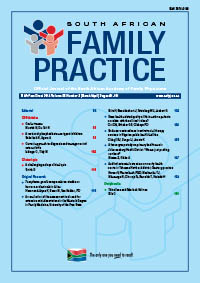Does health-related quality of life in asthma patients correlate with the clinical indices?
Keywords:
asthma, quality of life, correlation, determinants, indices
Abstract
Background: Assessment of health-related quality of life (HRQOL) has been shown to be more relevant to patients who have chronic diseases such as asthma, as achieving the best possible quality of life is the paramount objective in the management of such patients. This study assessed the quality of life of asthma patients and correlated it with the various clinical indices of asthma, such as age, sex, the duration of the asthma, medication used and its severity. Design: The study was a cross-sectional, analytical, case-control design, involving three approaches, i.e. quality of life, clinical assessment and lung function assessment. The patients who participated in this study completed the Asthma Quality of Life Questionnaire (AQLQ) and Asthma Control Questionnaire (ACQ). Statistical analysis was performed using Epi Info™ version 6.04. Setting and subjects: The clinical setting was the respiratory unit of the department of Medicine, University of Benin Teaching Hospital, Benin City, Nigeria. The recruited patients held various professions. A diagnosis of asthma was made using the clinical features of asthma and lung function measurements with a spirometer and MicroWright® Peak flow meters. Outcome measures: The outcome measures were the quality of life score scores and clinical indices of asthma in patients attending the respiratory unit of the University of Benin. Results: Subjects had significantly low lung function values when compared with the controls (p-value < 0.05). The quality of life of asthmatics was 4.82 ± 1.16 (1-7) and correlated with the duration of asthma (r = -0.83), body mass index, medication used (r = 0.96), asthma severity (r = 0.96) and gender (r = 1). The difference between male and female quality-of-life values was significant (p-value < 0.05). However, there was no correlation between age and quality of life (r = 0.06). Conclusion: The overall assessment showed that quality of life with regard to asthma was low in this study, and correlated with some clinical asthma indices. The determinants of quality of life in this study included the duration of asthma, body mass index, asthma severity, medication use and gender.
Published
2013-08-01
Section
Original Research
By submitting manuscripts to SAFP, authors of original articles are assigning copyright to the South African Academy of Family Physicians. Copyright of review articles are assigned to the Publisher, Medpharm Publications (Pty) Ltd, unless otherwise specified. Authors may use their own work after publication without written permission, provided they acknowledge the original source. Individuals and academic institutions may freely copy and distribute articles published in SAFP for educational and research purposes without obtaining permission.

